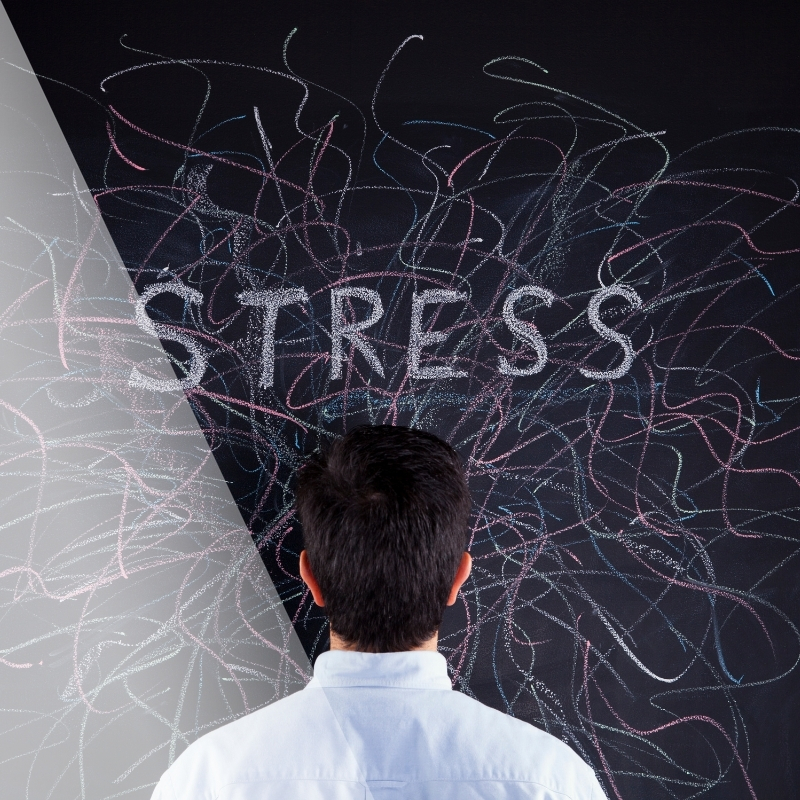Stress and acupuncture make a great pair. Stress is a natural response of the body to the various demands we place upon it. In ancient times, our stress response, also known as our fight or flight response, provided us with quick energy to preserve life during difficult situations. An example is being attacked or threatened by a wild animal. Unfortunately, modern day stress is considerably higher, more frequent and more consistent than what our predecessors experienced. Today, we do not have to look much further than our windows, or computer screens, to view various forms of stressors—everything from prime-time news and road rage, to the forty-hour work week, terrorism talk, world-wide pandemics and cell phones.
However, stress is not necessarily always negative. There is a distinction between healthy and unhealthy stress. Healthy stressors are usually short lived and keep us alert and motivated, and support our body’s strength and vitality.
 Our response to stress can either help or hinder our body’s ability to cope with these various stressors in our lives. Healthy responses to stress include appropriate physical exercise, good eating habits, positive thinking, adequate rest, and reaching out to friends and family for support. Unhealthy responses to stress include negative thinking, overexertion, poor eating habits, lack of sleep, and isolation.
Our response to stress can either help or hinder our body’s ability to cope with these various stressors in our lives. Healthy responses to stress include appropriate physical exercise, good eating habits, positive thinking, adequate rest, and reaching out to friends and family for support. Unhealthy responses to stress include negative thinking, overexertion, poor eating habits, lack of sleep, and isolation.
These unhealthy responses can cause the body to work harder than it needs to and can trigger physical and mental health issues. Over time, ongoing stress and unhealthy responses to stress can actually be detrimental to our health.
- Anger
- Anxiety
- Asthma
- Depression
- Supressed immune system
- Digestive disorders
- Headaches
- Heart disease
- High blood pressure
- Blood sugar issues
- Joint pain
- Weight problems
Medical studies
Medical studies have shown that with increased and consistent stress, our white blood cells which defend our body against viruses decrease. This results in lower immune resistance, ultimately leading to physical disease and emotional instability.
Even if the stressors are no longer present, the body continues to keep the stress response active. This results in the depletion of our nervous system, lymphatic organs (spleen, thymus, and lymph nodes), kidneys and adrenal glands, which can pave the way for a wide variety of symptoms and signs.
There is Hope.
Practitioners of acupuncture and Traditional Chinese Medicine (TCM) have been helping people cope with stress for thousands of years. The ancient theories of TCM on how stress affects the organs are similar to those of Western medicine. However, TCM theory and treatment go far beyond treating symptoms and signs and address the root cause(s) of the problem.
How Stress and Acupuncture Work
Acupuncture is a whole-body approach to healing. It takes a holistic and nurturing approach to healing the body. This is done by carefully inserting fine, sterile needles to stimulate important acupuncture meridian points found across the body to help promote healing. In addition to the insertion of needles, other techniques are sometimes used to stimulate the body’s natural healing abilities and to bring about homeostasis.
Acupuncture meridian points activate the body’s innate healing abilities acupuncturists call Qi (pronounced “chee”). According to TCM, Qi is the vital energy that animates the body and protects it from illness. Qi flows through pathways called meridians and provides nourishment to the boy’s cells, tissues, muscles, organs, and glands. When there is an imbalance or blockage in the flow of Qi, symptoms associated with the condition or illness may appear. Acupuncture is just one aspect of TCM, there are many modalities within TCM that may effectively contribute to restoring the body’s natural healing ability.
Most people experience little or no pain when receiving acupuncture – in fact, many people experience a deep sense of relief, relaxation and find acupuncture helps with their specific symptoms.
From a modern scientific perspective, stimulation of acupuncture meridian points causes the release of a multitude of nervous system chemicals in our brain, spinal cord, and muscles that help restore the body’s ability to heal naturally.
These chemicals provide tremendous healh benefits, whether it is influencing your body to heal more quickly, or simply altering how you may be experiencing your pain. Regardless, the healing and regenerative properties of acupuncture are truly amazing. The only way to find out if acupuncture is the perfect treatment plan for you is to give it a try.
Acupuncture and TCM can provide a safe, effective and drug-free alternative for the treatment of stress.
Ways to combat stress:
- Get adequate sleep. Aim for at least eight hours of restful and restorative sleep.
- Practice meditative exercises. Qi Gong, Tai Chi and Yoga can help create a healthy awareness of the body and mind connection, freeing your mind
of stressful thoughts. - Eat a well balanced diet. Be mindful of what you eat and you will feel less stressed and more balanced.
- Have fun! Make time for relaxing activities, enjoyable hobbies and lots of laughter in your life.
- Breathe. Relaxed deep breathing is one of the most easiest techniques you can use for reducing stress.
- Relax deeply. Acupuncture has been known to alleviate stress and anxiety.
Stress Reduction Resources:
For more information on allergies, check out this newsletter and article that I wrote for the SW Florida Health and Wellness Magazine.


